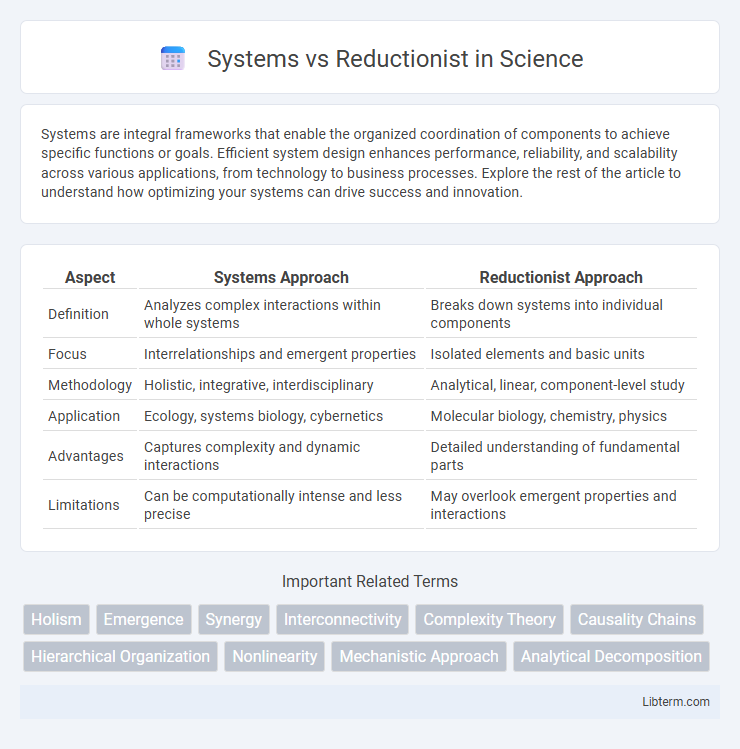Systems are integral frameworks that enable the organized coordination of components to achieve specific functions or goals. Efficient system design enhances performance, reliability, and scalability across various applications, from technology to business processes. Explore the rest of the article to understand how optimizing your systems can drive success and innovation.
Table of Comparison
| Aspect | Systems Approach | Reductionist Approach |
|---|---|---|
| Definition | Analyzes complex interactions within whole systems | Breaks down systems into individual components |
| Focus | Interrelationships and emergent properties | Isolated elements and basic units |
| Methodology | Holistic, integrative, interdisciplinary | Analytical, linear, component-level study |
| Application | Ecology, systems biology, cybernetics | Molecular biology, chemistry, physics |
| Advantages | Captures complexity and dynamic interactions | Detailed understanding of fundamental parts |
| Limitations | Can be computationally intense and less precise | May overlook emergent properties and interactions |
Understanding Systems Thinking
Systems thinking emphasizes holistic analysis by examining the interrelationships and interactions within complex systems, contrasting with reductionist approaches that dissect components in isolation. This methodology uncovers emergent properties and dynamic patterns that reductionism often overlooks, providing deeper insights into organizational behavior, ecological networks, and technological processes. Embracing systems thinking enhances problem-solving effectiveness by addressing root causes and feedback loops rather than merely symptoms.
The Core Principles of Reductionism
Reductionism is based on the core principles that complex systems can be understood by analyzing their individual components and interactions. It emphasizes breaking down phenomena into simpler parts to explain whole system behavior through the summation of these elements. This approach prioritizes linear cause-and-effect relationships and reduction of complexity for scientific clarity and predictability.
Historical Origins: Systems vs Reductionist Approaches
The historical origins of systems and reductionist approaches trace back to contrasting scientific traditions: reductionism emerged from classical physics in the 17th century, emphasizing the analysis of complex phenomena through their simplest components, as championed by figures like Rene Descartes and Isaac Newton. Systems theory developed in the 20th century, influenced by Ludwig von Bertalanffy's General Systems Theory, which argued for studying components holistically within their interrelationships rather than in isolation. These foundational perspectives have shaped modern science by informing distinct methodologies for understanding complexity, with reductionism focusing on parts and systems theory emphasizing wholes and interactions.
Key Differences Between Systems and Reductionist Views
Systems thinking emphasizes holistic understanding, analyzing interactions and relationships within whole entities, while reductionist views break down complex phenomena into individual components for detailed study. Systems approach highlights interdependencies and emergent properties, whereas reductionism focuses on isolated parts and linear cause-effect mechanisms. Key differences include the scope of analysis, with systems theory addressing complexity and context, and reductionism prioritizing simplicity and specificity.
Advantages of Systems Thinking in Modern Science
Systems thinking enhances modern science by enabling holistic analysis of complex interactions within biological, environmental, and social systems, revealing emergent properties overlooked by reductionist approaches. It supports interdisciplinary research, integrating data across molecular biology, ecology, and neuroscience to improve predictive models and innovative solutions. This approach facilitates adaptive management and sustainable development by considering feedback loops and dynamic relationships essential for addressing global challenges like climate change and public health.
Limitations of the Reductionist Method
The reductionist method often fails to capture the complexity of biological, ecological, and social systems by isolating individual components rather than examining interactions and emergent properties. Its limitations include an inability to explain holistic behaviors, dynamic feedback loops, and non-linear relationships inherent in complex systems. Consequently, relying solely on reductionism can lead to incomplete or misleading conclusions in fields like systems biology and environmental science.
Real-world Applications: Systems vs Reductionist Strategies
Systems strategies in real-world applications emphasize holistic analysis by integrating interconnected components to optimize complex processes like supply chain management and ecosystem conservation. Reductionist approaches focus on isolating individual elements for targeted interventions, such as drug development or mechanical part optimization, enabling precise control and detailed understanding. Combining both strategies enhances innovation in fields like healthcare and engineering by balancing comprehensive system insights with detailed component-specific improvements.
Integrating Systems and Reductionist Perspectives
Integrating systems and reductionist perspectives enhances scientific understanding by combining holistic analysis with detailed component examination. Systems thinking emphasizes interactions and emergent properties within complex networks, while reductionism focuses on isolating and studying individual parts at a fundamental level. This integration enables comprehensive problem-solving in fields like biology, medicine, and engineering, fostering innovation through multi-scale analysis.
Case Studies: Systems vs Reductionist Outcomes
Case studies comparing systems and reductionist approaches reveal distinct outcomes in problem-solving effectiveness and innovation. Systems thinking, emphasizing interconnections and holistic perspectives, often leads to sustainable solutions and improved adaptability in complex environments such as healthcare and ecosystem management. In contrast, reductionist methods, which isolate components and analyze them independently, frequently excel in scenarios demanding precise, mechanistic understanding, such as molecular biology and engineering diagnostics.
The Future of Holistic and Reductionist Science
Holistic science emphasizes interconnected systems and emergent properties, driving innovation in complex problem-solving such as ecosystem management and personalized medicine. Reductionist science continues to provide critical insights by isolating and analyzing individual components, especially in molecular biology and pharmacology. The future of scientific advancement relies on integrating holistic systems thinking with reductionist methods to enhance predictive accuracy and practical applications across diverse disciplines.
Systems Infographic

 libterm.com
libterm.com